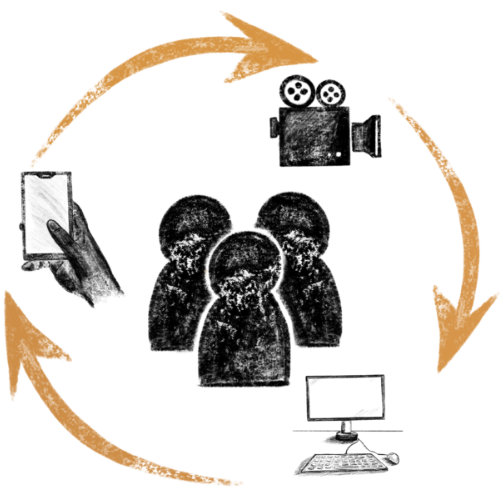DiD featuring at Visible Evidence at the University of Gdansk,
10th – 14th August 2022:
At this year’s Visible Evidence, we will present and discuss some of the key issues we in the DiD research network have been thinking through in the last months. In a panel with the title Images from the Past / Present / to Envision the Future – Emerging forms of Doing Documentary as Co-Creative Coping-strategies in Times of Crisis, we will probe into the promise of emerging documentary practices to overcome current crises – to embrace complexity, diversity, controversy, and uncertainty, to enable polyphony without cacophony, and to open spaces for the cultivation of epistemic ecologies.
As a teaser – here comes an excerpt from the panel description:
Currently, we are globally facing various crises: most obviously, certainly, the COVID-19 pandemic and the climate crisis. Alongside these forms of crises goes a crisis of representation: controversy and a general atmosphere of fear and uncertainty are on the rise, what seemed to be steadfast facts is shattered, and documentary’s truth claim is further up to debate. Thus, we are facing an interdependently twofold crisis: a crisis of representation which gets especially hazardous when it comes to dealing with the representation of crisis.
Though far from being an easy fit-all-solution, there might be a way out – maybe not least in the intermingling of the documentary tradition with documentary’s future: Ever since its beginnings, documentary has not only been an epistemic genre but has also been charged with a transformative impetus and an innate awareness of issues going alongside with politics of representation. This imbuement in combination with the affordances of digital media bears the potential to bring forth new forms of generating polyphonic, plurivocal ecologies of knowledge as well as dynamic, living archives – spaces of (self-)expression and negotiation of complex issues.
The first two presentations („Entangled Ecologies“, presented by Anna Wiehl, and „Producing global memory through collective narratives on the web“, presented by Jasmin Kermanchi) focus on one concrete variant of the currently most urgent crises and discuss different routes that interactive documentary takes to imbue practices of doing documentary in the present and by using legacies from the past to co-creatively envision possible futures. The third contribution („How to look at things now: from different perspectives, simultaneously“, presented by Florian Thalhofer) brings in an artistic perspective, combining reflections on multiperspectivism with complexity. Offering an unconventional notion of (database) documentary and archival work, it points ways out of the current double crisis on a more abstract level.
